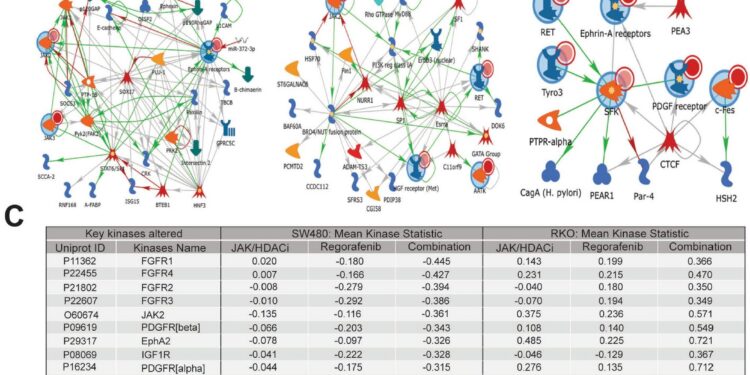Combination treatment of JAK/HDACi and regorafenib decreases kinase activity in CRC cells. Credit: Journal of Experimental and Clinical Cancer Research (2024). DOI: 10.1186/s13046-024-03106-8
Researchers at the University of Alabama at Birmingham have identified a promising new combination therapy for metastatic colorectal cancer that improves the effectiveness of existing treatment while reducing harmful side effects.
The study, published in the Journal of Experimental and Cancer Researchfocused on regorafenib, a drug that modestly improves survival in patients with metastatic colorectal cancer but often leads to severe toxicities. By combining regorafenib with a low-dose dual JAK/HDAC inhibitor, the researchers were able to significantly increase the drug’s anticancer activity.
Colorectal cancer is a leading cause of cancer death worldwide. For patients with metastatic disease, treatment options are limited and prognosis is often poor. Regorafenib, a multiple kinase inhibitor, is one of the few drugs available for these patients; but its use is hampered by significant toxicity, limiting its clinical benefit.
The research team, led by UAB Department of Pathology Professor Upender Manne, Ph.D., conducted a series of experiments using colorectal cancer cell lines, patient-derived xenografts and mouse models to test the effectiveness of the combination therapy.
They studied the effects of this combination on cell viability, cell cycle progression, apoptosis (programmed cell death) and molecular signaling pathways. The researchers studied the influence of the treatment on the immune response to tumors.
“Our study results provide new hope for translating this breakthrough into a widely available treatment for metastatic colorectal cancer,” Manne said. “For our team, this is a continuation of our quest to outsmart cancer, one discovery at a time.”
The combination therapy outperformed regorafenib alone on several parameters. It significantly reduced tumor cell viability, induced G0-G1 cell cycle arrest, and promoted apoptosis. The combination also inhibited key molecular pathways involved in cancer growth, including those regulated by JAK, STAT3, and EGFR. Importantly, the treatment enhanced the ability of the immune system to target the tumor, as evidenced by increased infiltration of immune cells into the tumor microenvironment.
In animal models, the combination therapy resulted in a significant reduction in tumor growth and metastases. Pharmacokinetic studies also revealed that the combination increased the bioavailability of regorafenib, meaning that more of the drug was available to exert its effects, potentially allowing lower doses and reduced toxicity.
The study results suggest that combining regorafenib with a dual JAK/HDAC inhibitor may be a more effective and safer approach to treating metastatic colorectal cancer. The promising preclinical results pave the way for clinical trials to evaluate the potential of this combination therapy in patients. If successful, this approach could provide a new lifeline for people battling advanced colorectal cancer, offering hope for improved outcomes with fewer side effects.
More information:
Prachi Bajpai et al, Combination of a dual JAK/HDAC inhibitor with regorafenib synergistically reduces tumor growth, metastasis, and regorafenib-induced toxicity in colorectal cancer, Journal of Experimental and Clinical Cancer Research (2024). DOI: 10.1186/s13046-024-03106-8
Provided by the University of Alabama at Birmingham
Quote:New combination therapy could offer safer, more effective treatment for colorectal cancer (2024, September 4) retrieved September 4, 2024 from
This document is subject to copyright. Apart from any fair dealing for the purpose of private study or research, no part may be reproduced without written permission. The content is provided for informational purposes only.



